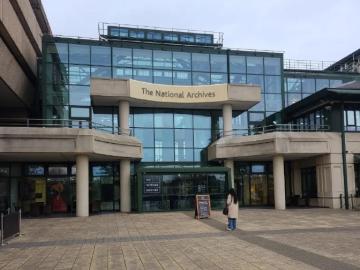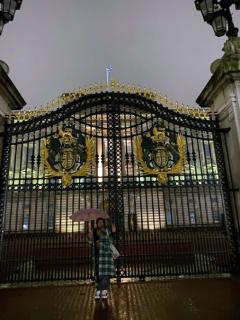Travel to London
by Sashawna Isaacs ’23
In January 2023, I traveled to London, England to conduct research for my senior thesis. My project centered around Jamaican women migrants to Cuba in the post-war period to Jamaica’s independence in 1962. Of course, I wanted to track their journeys and reasons for migrating. However, I also wanted to understand how they created fruitful lives for themselves socially and politically. The topic of my thesis is particularly meaningful to me because I am the daughter of Jamaican immigrants. Originally, I wanted to visit the archives in Jamaica, but due to the efforts of my incredibly helpful thesis advisor, Professor Ismail Rashid, we were able to find a series of documents in the British National Archives that documented Jamaican immigrants in Cuba starting in 1957 and ending in 1961. Discovering these documents felt like stumbling across a gold mine, and they did not disappoint.

The archives are located in the beautiful and quaint district of Kew, Richmond, which is also the home of the Kew Botanic Gardens. The walk from the train station to the archives building did not get old. The series of documents that I went to see were actually recalled the year prior to my trip after the archivists discovered the presence of historical pesticides. They ruled that the pesticides were not that dangerous and reinstated the collection for viewing. Still, I had to wear hazard gear and view the sources in a separate room. At first, I was apprehensive of “relying” on colonial governmental records because the ethos of my thesis was to highlight the agency and voices of Jamaican women migrants. However, from the first document I saw, it was clear that this series would be integral to the fulfillment of my project.
It is important to emphasize that the Clark Fellowship is not only for archival research. The Clark Fellowship allows students to gain cultural knowledge and experiences. This trip was actually my first time in London and I was able to enjoy much of what the city has to offer. I visited the city of Westminster, saw Big Ben, Buckingham Palace, numerous national High Commissions, and more. As important as my archival work was, the times I spent exploring London have become meaningful memories for me. On the Monday of my trip, the National Archives were closed. So, I used that time to visit the infamous British Museum and the lively British Library.

Upon my visit, it was evident that the British Museum is undergoing a period of transformation of racial reckoning after the murder of George Floyd. A number of exhibits, such as the one on Africa, were closed in an effort to re-imagine how cultural artifacts and exhibits can ethically exist in a post-colonial context. This time of reckoning evoked similar threads pertinent to my thesis. Issues concerning colonial memories and how both the government and citizenry dealt with these legacies goes to the heart of my thesis. The British Library was such a joy to visit. The British Library is very accepting to anyone with genuine research interests. Therefore, I was able to work in the Reading Rooms and viewed many sources, some of which I am actually using in my thesis. The sources at the library varied greatly from those in the FCO 141 Series. Unlike many of the documents from the archives, library sources were often literary and conveyed the lives and ideologies of Jamaican women in their own words.
My only regret of the trip was that I was unable to see the Black Cultural Archives (BCA) in Brixton. The BCA is a culturally and historically rich institution that specializes in the preservation and amplification of the histories of people of African and Caribbean descent in the United Kingdom. The mission of the BCA perfectly aligned with the purpose of my thesis. Unfortunately, the archive’s reading rooms were closed for maintenance and I was unable to visit. Nonetheless, the BCA is an active embodiment of the Black British community’s substantial efforts to highlight their historically marginalized stories.
This trip to London was unforgettable and so essential to shaping my thesis experience.
My thesis would not have been possible without the access to sources I acquired without the Evalyn Clark Travel Fellowship. I cannot thank the Committee enough for their generosity and belief in my project. I also could not have embarked on this journey without the support and efforts of the Vassar History Department. Thank you so much for helping me realize this project, which I view as a love letter to Jamaican women- women like my mother.